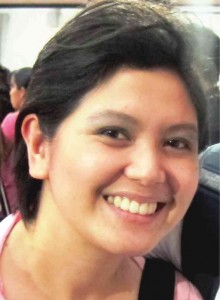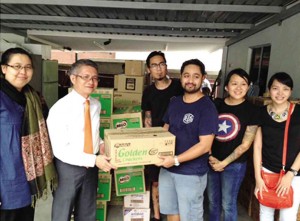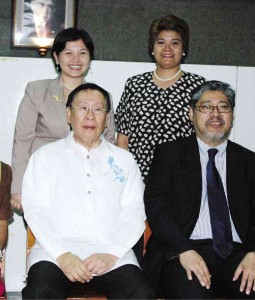A foreign officer’s secret ace

Expatriate Filipino parents often hesitate sending their children to local schools in their host countries, worried about the language problem. They often insist their children master English instead and send them to international schools.
Anna studied at Ruam Rudee International School in Bangkok. But she constantly mingled with other international students, including Thai students and teachers. In the process, she gained fluency in the Thai language.
For Anna, now 33, her fluency in Thai would eventually become an advantage.
“I never knew that my good grasp of the Thai language, having it almost as my first language, would become an advantage for me,” said Anna, who has since joined the Philippine foreign service.
“I had a memorable stay in Thailand. I was born in Bangkok and lived there for almost 12 years before returning to Manila. I learned Thai from hearing Thais speak, listening to Thai news and watching Thai lakorns (dramas or soap operas),” she says.
An only child, most of Anna’s friends were children of embassy personnel and other kids of expatriates who also spoke Thai, English and sometimes
Filipino.
Surprisingly, she recalls, “very few people knew I could speak Thai,” she recalls. English and Filipino was the language always spoken in the family.
When her father’s term ended, the Santos family returned to the Philippines. She entered high school at St. Bridget School in Metro Manila and later on took BS Psychology at the Ateneo de Manila University. All those years, she was not able to return to Thailand because of her studies, but the language remained with her. “It had become a part of me,” she explains.
Later she worked at the Hyatt Regency Hotel in Saipan where her father was assigned.
“The life of an OFW is not new to me,” she says of her experience working in Saipan for almost two years. She came home to teach at the Ateneo grade school for five years but due to a throat problem, she quit.
At that time, she was becoming interested in the Foreign Service.
“I had always been interested in the Foreign Service. However, because my father had been in the service, I needed to wait for the time when I would feel that it was my personal desire and not the desire of my parents that was pushing me to enter the Department of Foreign Affairs. My motives for joining had yet to be refined and strengthened.
Eventually, she mustered the courage to take the Foreign Service Officers Exam. The DFA accepts graduates of various courses. Thus, I was qualified to take the exam,” she explains.
So years later, the opportunity to use the Thai language did come—when she was assigned as a neophyte Foreign Service Officer to the Philippine Embassy in Bangkok.

Philippine ambassador to Malaysia, J. Eduardo Malaya, receives from Tengku Muamir Izzudin (third from right) boxes of relief goods which were collected by the Think Tank Sdn Bhd and Harley Bikers group in the Klang area. The initiative was started by Filipino expat Peaches Aberin (standing far right). Filipino community organization KL Pinoy, Isabelino Ako and BIBAK also pitched in boxes of goods, as did the British School in Kuala Lumpur. There has been an overwhelming number of donations pouring into the Embassy from individuals, companies and groups, said the ambassador, conveying country’s deepest appreciation and gratitude to Malaysians from all walks of life who lent a hand to help victims of Supertyphoon “Yolanda.” The Embassy expressed its thanks to the Malaysian Government for the food, medical aid, a field hospital and other relief assistance it has airlifted. He also expressed deep gratitude to Mercy Malaysia, Kelab Putera 1Malaysia and other nongovernmental organizations which have gone or are going to the Visayas to extend assistance. Malaya likewise praised the Filipino community in Malaysia, “whose bayanihan or gotong royong spirit is truly alive as they undertake fund-raising and relief drive activities.”
Santos joined the DFA in 2009 and underwent a six-month cadetship or training course. She was deployed in Thailand on April 28 as Third Secretary and Vice-Consul.
“Knowing how to communicate in Thai is a plus, especially since I was assigned to Thailand. Aside from the language, I have good background on the culture of the Thai people, which also helps,” she says.
For young Filipinos abroad and in the Philippines whose careers are just taking off, she says: Let us continue to learn and improve.
As for expat children, learning a new language and exposure to other cultures may yet become their secret ace.
